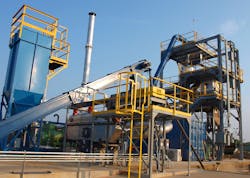Waste-to-Energy Facility Approved for Construction in Tennessee
PHG Energy (PHGE) and the city of Lebanon, Tenn., have signed a contract that will provide a sustainable method of waste disposal and produce green power in the process.
The waste-to-energy technology, which will go online early next year, is a downdraft gasification plant that will cleanly convert up to 64 tons per day of blended waste wood, scrap tires and sewer sludge into a fuel gas that will generate up to 300 kW of electricity. The generation of this power will provide for the plant’s internal power needs as well as contribute electricity to the wastewater treatment plant where it will be located.
“This is not incineration or burning,” Lebanon Mayor Philip Craighead said. “There is no smoke or odor. The feedstock material is broken down at very high temperatures in a sealed vessel, and about 95% of what goes into the gasifier comes out as the fuel gas.” Craighead also said the remaining 5% to 10% of material exiting the gasifier is a high-carbon biochar that can be recycled or sold for agricultural or industrial uses.
PHGE President Tom Stanzione said the Lebanon project will deploy what his company believes is the world’s largest downdraft gasifier and added, “This is the same basic technology we utilized in all our previous designs, and we have upgraded capacity and power density to accomplish a lot more gasification in what is not a lot more space.”
The Large Frame gasifier, as the company refers to it, has been vetted through a testing process for more than two years at PHGE’s research facility. A standard PHGE gasifier can convert up to 12 tons of feedstock per day to fuel gas, while the Lebanon model will process up to 64 tons per day without substantially increasing the footprint of the plant.
The plant is projected to keep more 8,000 tons of material out of landfills each year. Carbon dioxide emissions will be reduced as well, keeping more than 2,500 tons out of the atmosphere each year.
Funding of the $3.5 million capital cost has been obtained through a federal program that awards bond subsidies to local projects that conserve energy. Those Qualified Energy Conservation Bonds are allocated through the Tennessee Department of Environment and Conservation (TDEC), and repay communities about 70% of interest expense.
Craighead said the city is viewing this installation as a first stage in a larger plan to convert the city’s household and commercial garbage to energy in the future.
“We see keeping our garbage out of the landfill and using it to make energy as major goals for Lebanon in coming years,” Craighead said. “This is a problem that is coming straight at all of us, and we are going to make sure our city is ready with answers. One of our primary criteria is that the solutions we want will have to make good financial sense along the way.”
Source: PHG Energy
